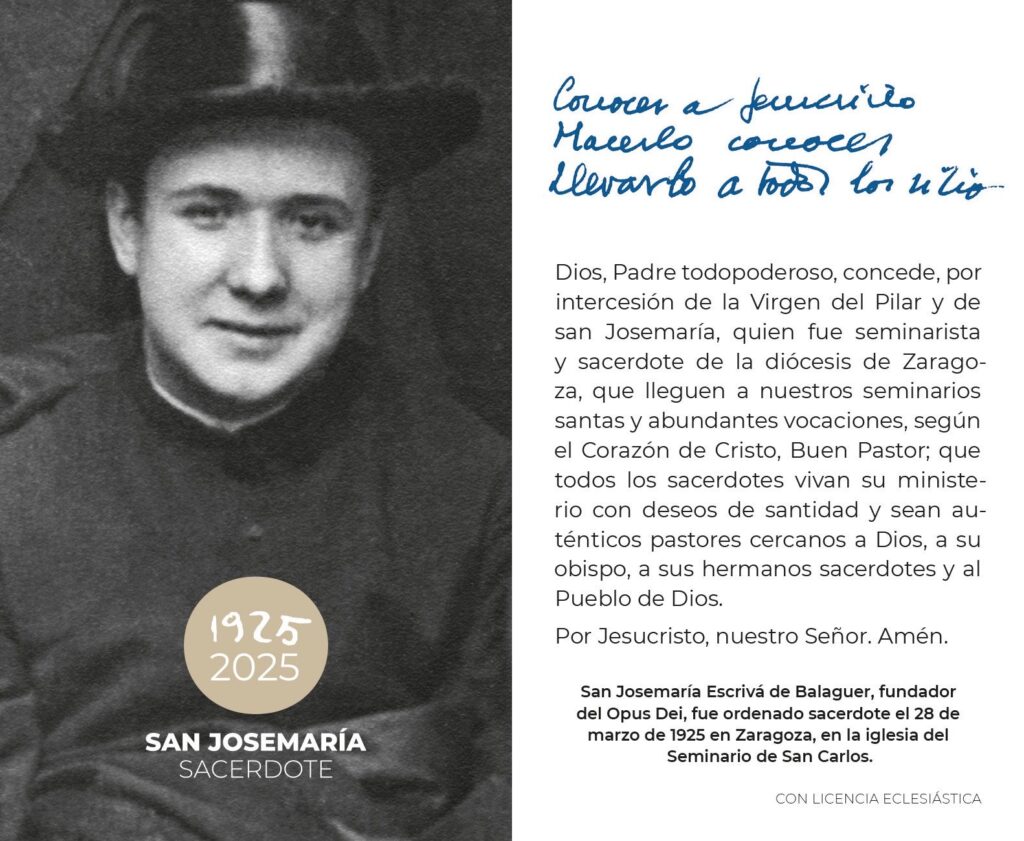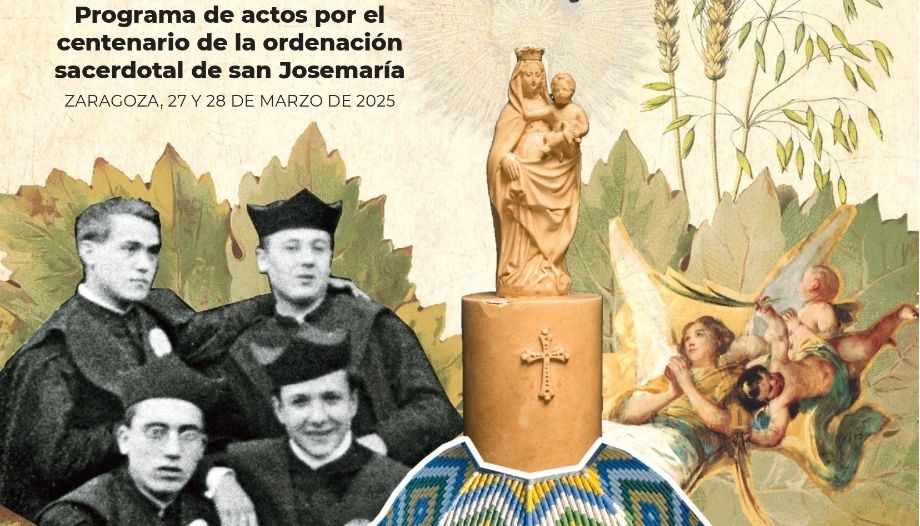St. Josemaría Escrivá was ordained a priest on March 28, 1925 in Saragossa, in the church of the Seminary of San Carlos, by Bishop Miguel de los Santos Díaz Gómara.
One hundred years have passed, and on the occasion of the centenary of his ordination to the priesthood, a series of events will take place in the Aragonese capital, in which will participate the Cardinal Lazaro You Heung-sik, Prefect of the Dicastery for the Clergy, and the Prelate of Opus Dei, Msgr. Fernando Ocáriz.
About the program of eventsthe organizers, the Alacet Priests' Library, with the collaboration of CARF Foundation and Omnes, inform that first of all, the academic act will take place on Thursday 27th, which is reported below.
Eucharist, prayer vigil
At its conclusion, at 7:00 p.m., a Eucharistic concelebration will take place in the Basilica del Pilar for the priests who wish to attend.
Afterwards (8:00 p.m.), a prayer vigil for vocations will be held for seminarians, young people and families in the church of the Royal Seminary of San Carlos Borromeo, presided over by the Cardinal Lazzaro You.
On March 28, the anniversary day, there will be a solemn Eucharistic concelebration, also in the church of the Seminary of St. Charles Borromeo, in thanksgiving for the fruits of priestly holiness. Afterwards, a fraternal meal will be held in the Throne Room of the Archbishop's Palace.

Academic event
The academic ceremony on the 27th will begin with welcoming remarks by Archbishop Carlos Escribano, Archbishop of Zaragoza, who currently presides over the Episcopal Commission for the Laity, Family and Life of the Spanish Episcopal Conference.
Cardinal Lazzaro You, in addition to being Prefect of the Dicastery for the Clergy, is also a member of the Dicasteries for Divine Worship and the Discipline of the Sacraments; for Bishops; for Evangelization; for Culture and Education; and of the Pontifical Committee for International Eucharistic Congresses. At the conference he will speak on the holiness and mission of the priest.
Monsignor Fernando Ocáriz, born in Paris in 1944, has been prelate of Opus Dei since January 2017. He is a physicist and theologian, consultor to the Dicastery for the Doctrine of the Faith since 1986 and to the Dicastery for Evangelization since 2022. In 1989 he joined the Pontifical Theological Academy. He will speak in Zaragoza on the centrality of the Eucharist in the life of the priest.
Other speakers
Before, José Luis González GullónThe panel discussion will focus on St. Josemaría's seminary and ordination years. In the afternoon, there will be a round table discussion on the universal heart of the priest: from East to West, passing through the rural world.
The following will participate at the table Esteban AranazJorge de Salas, a priest from the Diocese of Tarazona, a missionary in China; Jorge de Salas, a priest of the Prelature of Opus Dei living in Sweden, judicial vicar of the diocese of Stockholm; and Antonio Cobo, a priest of the Diocese of Almeria in the Alpujarra.
Golden jubilee of priesthood in 1975
St. Josemaría celebrated his Golden Jubilee of priesthood on March 28, 1975, a year before his death in Rome. In mid-January, before crossing the Atlantic on a catechetical trip to America, he addressed a letter to the faithful of Opus Dei in which, as he transcribes Andrés Vázquez de Prada in his biography, he told them:
"I ask you to be very united on that day, with a deeper gratitude to the Lord - it is Good Friday this March 28 - who has pushed us to participate in his Holy Cross, that is to say, of the Love that does not set conditions".
St. Josemaría He also asked them: "Join me in adoring Our Redeemer, truly present in the Holy Eucharist, in all the Monuments of all the churches of the world, on this Good Friday. Let us live a day of intense and loving adoration".









